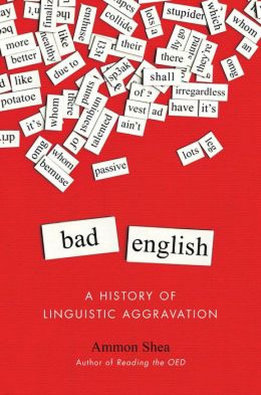 Written by Lauryn Smith Hopefully my review of Ammon Shea’s “Bad English” leaves no stone unturned, literally bemusing you because it ain’t boring irregardless of your interest in linguistics. Did anyone cringe at my depraved use of the English language in that opening sentence? Good. I intended that, and Shea was my inspiration. In his nonfiction book “Bad English,” Shea delineates the language's history, illustrating the worries, objections and complaints of grammarians throughout the ages. In doing so, he intentionally commits linguistic crimes and provides examples of historic and contemporary linguistic "mistakes," ultimately concluding that English is a hot mess but in the best way possible. Shea subtly yet successfully argues against those who take a prescriptive approach to English. He demonstrates that it is not necessary to fight over language. Instead, he shows that language is alive, that it is an interesting subject for study, debate and conversation. According to Shea, there is no right or wrong way to use English as every rule has evidence of being broken. Within the text, Shea presents both sides of the story, citing supporters and detractors of various of English’s canons. To clarify his points, he picks individual words and grammatical tendencies and follows their histories, explaining arguments and counterarguments surrounding their usage. He covers some expected terms, such as “hopefully,” “literally” and “irregardless,” but also less common ones, such as “very,” “donate” and “belittle.” Overall, "Bad English" is a well written, enlightening read. The only qualm I have with the book concerns the list of 221 words that were once “frowned upon,” which Shea includes as its final chapter. Shea quotes people’s arguments against each word, and the tedium of reading the list is exhausting. After witnessing how interesting the history of individual words and linguistic ideologies can be, it is disappointing to see such a list given superficial attention. Expounding on each would admittedly add too much length to the book, so perhaps that section should have been excluded, or even saved for a potential "sequel."
Nevertheless, Shea, a linguistics expert and author of “Reading the OED” and many other books on the English language, excels at elucidating that there is no “correct” way to speak or write in English, despite many people’s efforts to promote the contrary. Some words that we now take as commonplace were once considered mere slang. Others were once thought rude or impolite. For instance, in the past referring to your “leg” instead of your “limb” in front of a lady would have caused her to blush in embarrassment. Seriously! I will admit, I previously enjoyed picking out flaws in correspondences, textbooks, advertisements and the like. But since reading “Bad English,” that hobby has lost its charm. Now I am more attuned to the evolving, innovative nature of English. Since its inception, English has been a language of constant change, a facet of its being used regularly by large groups of people. Some changes are extreme. Take for example the words “uninterested” and “disinterested,” the definitions for which, Shea shows, have completely swapped over time. Linguistics can be mind-boggling, but readers learn that this quality is not necessarily a bad thing. In fact, it almost makes English more interesting. Pay attention to its use. Consider the ways in which people use words and punctuation marks. Are their mistakes always really “wrong?” Not really. As Shea purports, even Shakespeare and other classic writers are known to have "misused” the English language. Without a bit of lenience, language would not be as imaginative or striking as it can be. “To be, or not to be: that is the statement” just does not have the right ring to it. For those who are wondering, no, you do not need to be a linguist to understand the concepts Shea presents in “Bad English.” (But curiousness regarding language, writing or the like will certainly help you maintain concentration while reading.) Shea's work is extremely well researched, and when things get confusing or overly academic in terms of context and jargon, he clarifies and defines. His witty, lively sense of humor is also evident, which helps when deep into a subject that could easily be drier than the Sahara. Readers of this book will learn that English changes over time, and it likely always will. Perhaps that is its one consistency. Whether due to invasions or inventions, language conforms to the times, something Shea suggests should be celebrated rather than scorned. Besides, what constitutes "proper" English is arbitrary. We can relax. A language's rules serve a purpose, but maybe it is okay if someone says “funner” or “OMG.” English will not crumble. But bear in mind Shea’s one piece of linguistic advice: “Just because you can do something does not mean that you should.” Alright now, there are, like, tons of other books which I gotta start reading. Title: Bad English: A History of Linguistic Aggravation Author: Ammon Shea Publisher: Perigee Books Publication date: June 3, 2014 Page count: 272 List price: $24 ISBN: 978-0399165573
1 Comment
Your comment will be posted after it is approved.
Leave a Reply. |

Enjoying my book reviews? If you’ve found them helpful or simply love diving into a good book, consider supporting my caffeine-fueled reading sessions! Your contribution helps keep the reviews coming and ensures I stay wide awake for those late-night reading marathons. Cheers to a shared love for literature! ☕️
Categories
All
|
